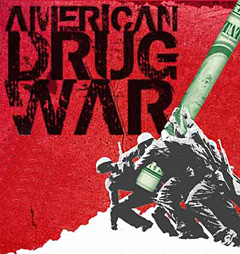
|  |  |  Editorials | Opinions | June 2009 Editorials | Opinions | June 2009  
Drugs Won the War
 Nicholas D. Kristof - New York Times Nicholas D. Kristof - New York Times
go to original


| | Some wars aren't meant to be won... |  |
This year marks the 40th anniversary of President Richard Nixon's start of the war on drugs, and it now appears that drugs have won.

"We've spent a trillion dollars prosecuting the war on drugs," Norm Stamper, a former police chief of Seattle, told me. "What do we have to show for it? Drugs are more readily available, at lower prices and higher levels of potency. It's a dismal failure."

For that reason, he favors legalization of drugs. Other experts favor keeping drug production and sales illegal but decriminalizing possession, as some foreign countries have done.

In the United States, four decades of drug war have had three consequences:

First, we have vastly increased the proportion of our population in prisons. The United States now incarcerates people at a rate nearly five times the world average. Until the war on drugs, our incarceration rate was roughly the same as that of other countries.

Second, we have empowered criminals at home and terrorists abroad. One reason many prominent economists have favored easing drug laws is that interdiction raises prices, which increases profit margins for everyone. Former presidents of Mexico, Brazil and Colombia this year jointly implored the United States to adopt a new approach to narcotics, based on the public health campaign against tobacco.

Third, we have squandered resources. Jeffrey Miron, a Harvard economist, found that federal, state and local governments spend $44.1 billion annually enforcing drug prohibitions. We spend seven times as much on drug interdiction, policing and imprisonment as on treatment.

I've seen lives destroyed by drugs. Yet I find people like Mr. Stamper persuasive when they argue that if our aim is to reduce the influence of harmful drugs, we can do better.

Mr. Stamper is active in Law Enforcement Against Prohibition, or LEAP, an organization of police officers, prosecutors, judges and citizens who favor a dramatic liberalization of American drug laws. He said he gradually became disillusioned with the drug war, beginning in 1967 when he was a young beat officer in San Diego.

It's now broadly acknowledged that the drug war approach has failed. President Obama's new drug czar, Gil Kerlikowske, told the Wall Street Journal that he wants to banish the war on drugs phraseology, while shifting more toward treatment over imprisonment.

The stakes are huge, the uncertainties great, and there's a genuine risk that liberalizing drug laws might lead to an increase in use and in addiction. But the evidence suggests that such a risk is small. After all, cocaine was used at only one-fifth of current levels when it was legal in the United States before 1914. And those states that have decriminalized marijuana possession have not seen surging consumption.

"I don't see any big downside to marijuana decriminalization," said Peter Reuter, a professor of criminology at the University of Maryland who has been skeptical of some of the arguments of the legalization camp. At most, there would be only a modest increase in usage.

We need to be less ideological and more empirical in figuring out what works in combating our drug problem. One approach would be for a state or two to experiment with legalization of marijuana, while measuring the impact on usage and crime.

Senator Jim Webb of Virginia has sponsored legislation to create a presidential commission to examine various elements of the criminal justice system, including drug policy. So far 28 senators have co-sponsored the legislation, and Mr. Webb says that Mr. Obama has been supportive of the idea as well.

"Our nation's broken drug policies are just one reason why we must re-examine the entire criminal justice system," Mr. Webb says.

That's a brave position for a politician, and it's the kind of leadership that we need as we grope toward a more effective strategy against narcotics in America. |

 |
|  |



